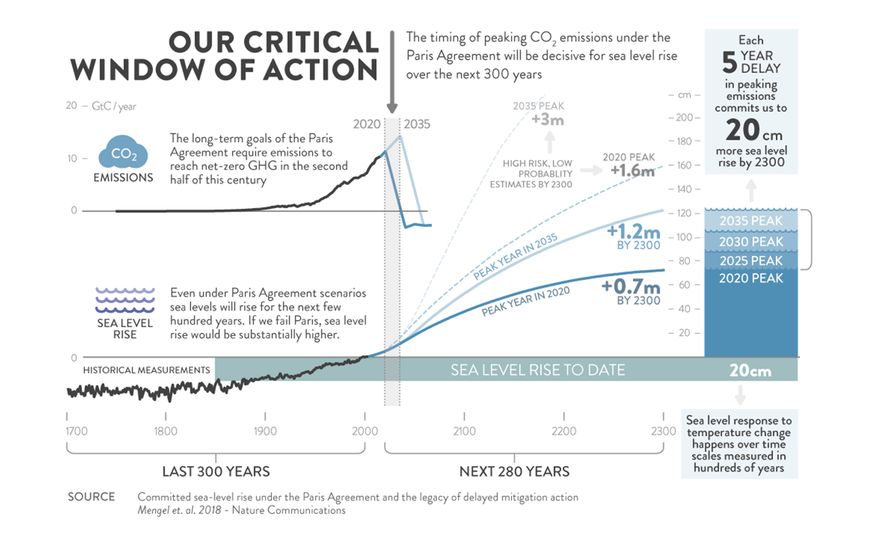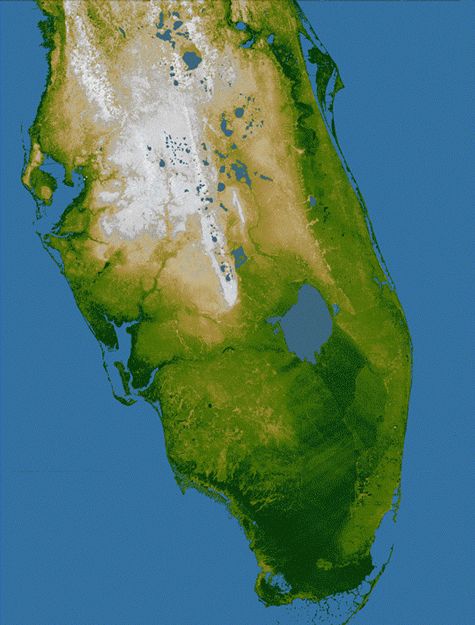
2nd March 2018 Sea levels will continue to rise until at least 2300 Even if the Paris Agreement is implemented in full, global sea levels will continue to rise for the next few centuries. Each five year delay in peaking global CO2 emissions will increase median sea level rise estimates for 2300 by 20 cm (7.9 in). That's the stark conclusion of a study by the Potsdam Institute for Climate Impact Research (PIK), which underscores the magnitude and duration of the crisis now facing humanity. The impacts of sea level rise are already beginning to be felt in many low-lying parts of the world. "Man-made climate change has already pre-programmed a certain amount of sea-level rise for the coming centuries, so for some it might seem that our present actions might not make such a big difference – but our study illustrates how wrong this perception is," explains lead author, Matthias Mengel. "Every delay in peaking emissions by five years between 2020 and 2035 could mean an additional 20 cm of sea level rise in the end – which is the same amount the world's coasts have experienced since the beginning of the pre-industrial era."
Sea levels are driven by a combination of warming and expanding ocean water, as well as the melting of glaciers, ice caps, and the vast Greenland and Antarctic ice sheets. These contributors respond in different ways and within different timescales to a warmer climate, ranging from centuries to millennia – the delayed response of today's atmospheric warming. To analyse sea level rise under the Paris Agreement and the long-term result of delayed mitigation, the team used a combined climate-sea-level model. They fed it with a set of scenarios of emission reductions in line with the Paris goals that span different reduction rates and emission peak years. The model was able to represent each sea level contributor individually and thus reflected their different responses to a warming world. The study authors incorporated new scientific insights, which point to an Antarctic ice sheet being very sensitive to atmospheric warming: "Indeed, the uncertainty of future sea level rise is at present dominated by the response of Antarctica," says Mengel. "With present knowledge on ice sheet instability, large ice loss from Antarctica seems possible even under modest warming in line with the Paris agreement. Even a sea level rise of up to three metres by 2300 cannot be ruled out completely, as we are not yet fully certain how the Antarctic ice sheet will respond to global warming." "The Paris Agreement calls for emissions to peak as soon as possible," adds co-author Carl-Friedrich Schleussner from PIK and Climate Analytics, a non-profit research and policy institute in Berlin. "This might sound like a hollow phrase to some, but our results show that there are quantifiable consequences of delaying action. So even within the Paris Agreement range, swift climate mitigation is crucial to limit additional risks. For millions of people around the world living in coastal areas, every centimetre can make a difference – to limit sea level rise risks, immediate CO2 reduction is key." The team's study appears in Nature Communications.
Comments »
If you enjoyed this article, please consider sharing it:
|








